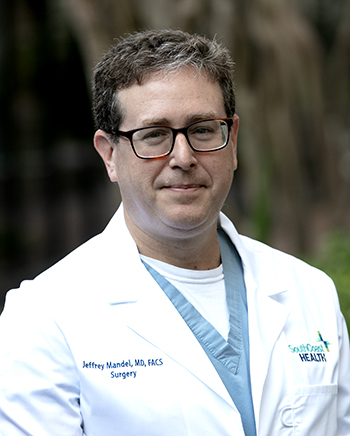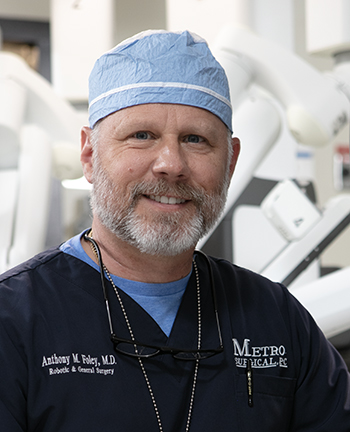Understanding types, causes and preventing hernias
Miscellaneous
Hernias don’t disappear without surgery, so two of St. Joseph’s/Candler’s hernia repair surgeons explain this common condition
When you hear the word hernia, do you think of a painful result from lifting something heavy? Or something mostly men have to deal with it?
There may be more to hernias than your realize, including the different types of hernias and the fact they can occur in men, women and even children.
Generally speaking, “a hernia is a defect in the muscle wall, basically a weak point in the body,” explains Dr. Jeffrey Mandel, general surgeon and co-director of the St. Joseph’s/Candler Hernia Center of Excellence.

“There are places where people have commonly occurring hernias, such as the groin in men, or when a woman gets a hernia at the umbilicus (or belly button) during pregnancy,” Dr. Mandel says. “Sometimes when people lift things too heavy and strain too much, that can cause a hernia.”
Did you also know hernias – in adults – never go away without surgery? But thanks to minimally-invasive surgical options, you can have a quicker, less painful recovery for hernia repair.
“One of the common misconceptions is people think that you’re going to have a hernia removed just because they see a bulge as something that needs to be taken out or removed,” says Dr. Anthony Foley, general surgeon and co-director of the St. Joseph’s/Candler Hernia Center of Excellence. “Ultimately, what typically happens is that the hernia contents get pulled back inside the abdomen where they belong, and then the defect in the abdominal wall is repaired.”
Types of hernias
There are different types of hernias. Some of the more common ones include:
- Inguinal Hernia: This type of hernia occurs when tissue, such as from the intestine or colon, protrudes through an opening or weak spot in your lower abdominal wall or the groin. The hernia causes a lump in your groin and over time may get bigger. These types of hernias are most common in men because of a natural weakness in this area.
- Hiatal or paraesophageal hernia: In a hiatal hernia, part of your stomach pushes up through a natural opening (the hiatus) in your diaphragm, which is the muscle the separates the abdomen and the chest. Normally, your food pipe (esophagus) passes through the hiatus and joins your stomach. However with a paraesophageal hernia, the top part of your stomach slides up through that opening and sits next to the esophagus.
- Ventral hernia: A ventral hernia occurs when a bulge of tissue goes through an opening of the anterior abdominal wall. Symptoms often include pain in the abdomen, especially when lifting something.
- Incisional hernia: Many ventral hernias are also called incisional hernias because they form at the site of a past surgical incision that has not healed properly. Unlike other types of hernias, these occur at a site of trauma to the abdominal wall rather than at a natural weak spot.
What causes a hernia?
Almost all hernia types are caused by a combination of pressure and an opening or weakness of muscle or tissue.
“Basically, the pressure pushes an organ or tissue through an opening or weak spot,” Dr. Mandel says.
There may be different reasons pressure occurs to cause a hernia including:
- Lifting heavy objects
- Diarrhea or constipation
- Persistent coughing or sneezing
- Repeated vomiting
- Pregnancy
Heredity also may play a factor but more research needs to be done.

“We know hernias don’t run in the family like brown hair or blue eyes,” Dr. Foley says. “But we do notice that if you have family members who have had hernias, there is a little bit higher chance that you may develop them.”
Controllable lifestyle factors may also play a role, not just in preventing hernias but also repairing them during surgery. These include:
- Maintaining a healthy weight
- Following a healthy diet
- Quitting or never starting smoking
- Limiting steroid use, especially leading up to a hernia repair surgery
- Controlling diagnosed chronic diseases, especially diabetes
Are hernias preventable?
Not really, especially if there a hereditary component, both Dr. Foley and Dr. Mandel say. Like many other conditions, you want to maintain overall good health.
Yes, that includes exercise, but also be aware that if you are an avid exerciser, especially one that frequently lifts heavy weights, unnecessary stress and strain on the abdominal wall could lead to a hernia.
To request an appointment with one of our Surgeons of Excellence in hernia surgery, visit our website.
Coming Thursday: Did you know St. Joseph’s/Candler is an accredited Hernia Center of Excellence in surgical care? Learn more about the accreditation and treating hernias in Thursday’s Living Smart blog.